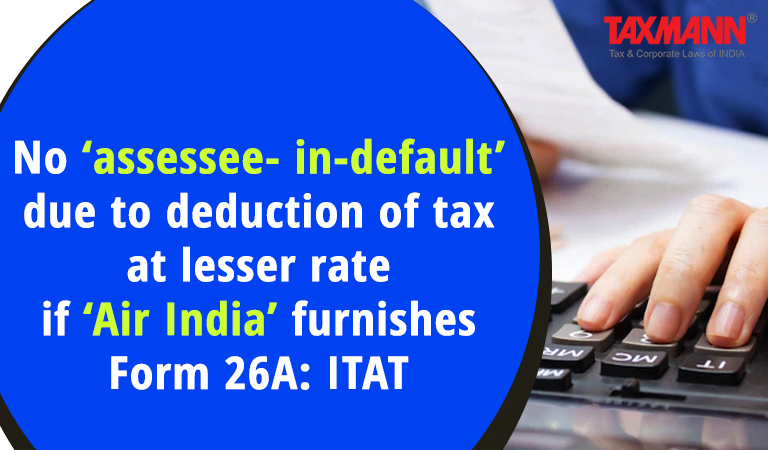No ‘assessee-in-default’ due to deduction of tax at lesser rate if ‘Air India’ furnishes Form 26A: ITAT
- Blog|News|Income Tax|
- 2 Min Read
- By Taxmann
- |
- Last Updated on 7 October, 2022

Case Details: Air India Ltd. v. CIT - [2022] 143 taxmann.com 52 (Mumbai-Trib.)
Judiciary and Counsel Details
-
- Kavitha Rajagopal, Judicial Member & Baskaran B.R., Accountant Member
- Rajnish Aggarwal for the Appellant.
- Manoj Sinha for the Respondent.
Facts of the Case
Assessee-Air India Ltd was in the business of transportation of passengers and cargo by air, mail, parcel, etc. Air India Engineering Services Ltd (AIESL) is a wholly-owned subsidiary of the assessee which was approved by DGCA for repairs and maintenance of aircraft placed in various cities.
During a survey, it was found that the assessee had paid certain sum to AIESL for repairs/maintenance on which tax was deducted at source (TDS) at the rate of 2% under section 194C.
The Assessing Officer concluded that the said services were in the nature of ‘fees for technical services’ which were liable for TDS at the rate of 10% under section 194J. Thus, he determined the amount of shortfall of TDS along with interest under section 201(1A).
On appeal, the CIT(A) confirmed the order of AO. Aggrieved-assessee filed the instant appeal before the Tribunal.
ITAT Held
The Tribunal held that as per the assessee’s contention, it shall be given the benefit of proviso to section 201(1) as AIESL had duly offered payments as its income. Proviso to section 201(1) provides that the assessee shall not be treated as an ‘assessee-in-default’ if it complies with certain conditions. Those conditions are:
a) Payee has furnished his return of income under section 139;
b) Payee has taken into account such sum for computing income in such return of income;
c) Payee has paid the tax due on the income declared by him in such return of income; and
d) Payer furnishes a certificate to this effect from an accountant in Form 26A.
When it was pointed out by the Tribunal that the assessee is required to furnish a certificate from an accountant to avail the benefit of the proviso, the assessee submitted that it shall submit the same before the AO.
Accordingly, it was held that in the interest of natural justice, the contention of the assessee may be accepted. However, the claim of the assessee requires verification at the end of the AO. Thus, the order passed by CIT(A) was set aside and restored the matter before AO.
Disclaimer: The content/information published on the website is only for general information of the user and shall not be construed as legal advice. While the Taxmann has exercised reasonable efforts to ensure the veracity of information/content published, Taxmann shall be under no liability in any manner whatsoever for incorrect information, if any.

Taxmann Publications has a dedicated in-house Research & Editorial Team. This team consists of a team of Chartered Accountants, Company Secretaries, and Lawyers. This team works under the guidance and supervision of editor-in-chief Mr Rakesh Bhargava.
The Research and Editorial Team is responsible for developing reliable and accurate content for the readers. The team follows the six-sigma approach to achieve the benchmark of zero error in its publications and research platforms. The team ensures that the following publication guidelines are thoroughly followed while developing the content:
- The statutory material is obtained only from the authorized and reliable sources
- All the latest developments in the judicial and legislative fields are covered
- Prepare the analytical write-ups on current, controversial, and important issues to help the readers to understand the concept and its implications
- Every content published by Taxmann is complete, accurate and lucid
- All evidence-based statements are supported with proper reference to Section, Circular No., Notification No. or citations
- The golden rules of grammar, style and consistency are thoroughly followed
- Font and size that’s easy to read and remain consistent across all imprint and digital publications are applied



 CA | CS | CMA
CA | CS | CMA
